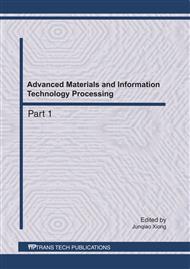[1]
McFarlane, D., Sarma, S., Chirn, J., Wong, C., Ashton, K., 2003. Auto ID systems and intelligent manufacturing control. Engineering Applications of Artificial Intelligence 16, 365–376.
DOI: 10.1016/s0952-1976(03)00077-0
Google Scholar
[2]
DeHoratius, N., Raman, A., 2008. Inventory record inaccuracy: an empirical analysis. Management Science 54, 627–641.
DOI: 10.1287/mnsc.1070.0789
Google Scholar
[3]
Raman, A., DeHoratius, N., Ton, Z., 2001. Execution: the missing link in retail operations. California Management Review 43 (3), 136–152.
DOI: 10.2307/41166093
Google Scholar
[4]
RFID price tag too high for the corrugated box industry, 2005. Industry Week. <http: /www. industryweek. com/ReadArticle. aspx?ArticleID=10321>.
Google Scholar
[5]
Beauchamp,M., 2008. Don't rule out the bar code. Dairy Industries International 73(5), 33–35.
Google Scholar
[6]
Gunasekaran,A., Ngai E.W.T., McGaughey R.E., 2006. Information technology and systems justification: A review for research and applications. European Journal of Operational Research 173(3), 957–983.
DOI: 10.1016/j.ejor.2005.06.002
Google Scholar
[7]
Zhou,W., 2009. RFID and item-level information visibility. European Journal of Operational Research 198(1), 252–258.
DOI: 10.1016/j.ejor.2008.09.017
Google Scholar
[8]
Atali,A., Lee H.L., Ozer,O., 2006. If the inventory manager knew: value of RFID under imperfect inventory information. Technical Report, Graduate School of Business, Stanford University.
DOI: 10.2139/ssrn.1351606
Google Scholar
[9]
Fleisch,E., Tellkamp,C., 2005. Inventory inaccuracy and supply chain performance: a simulation study of a retail supply chain. International Journal of Production Economics 95, 373–385.
DOI: 10.1016/j.ijpe.2004.02.003
Google Scholar
[10]
de Kok, A.G., Shang, H.K., 2007. Inspection and replenishment policies for systems with inventory record inaccuracy. Manufacturing and Service Operations Management 9(2), 185–205.
DOI: 10.1287/msom.1060.0136
Google Scholar
[11]
Rekik,Y., Sahin,E., Dallery,Y., 2007a. Analysis of the impact of the RFID technology on reducing product misplacement errors at retail stores. International Journal of Production Economics 112, 264–278.
DOI: 10.1016/j.ijpe.2006.08.024
Google Scholar
[12]
Leung Y.T., Cheng,F., Lee Y.M., Hennessy J.J., 2007. A Tool Set for Exploring the Value of Rfid in a Supply Chain. Springer Series in Advanced Manufacturing.
DOI: 10.1007/978-1-84628-607-0_3
Google Scholar
[13]
Bottani,E., Rizzi,A., 2008. Economical assessment of the impact of RFID technology and EPC system on the fast-moving consumer goods supply chain. International Journal of Production Economics 112, 548–569.
DOI: 10.1016/j.ijpe.2007.05.007
Google Scholar


